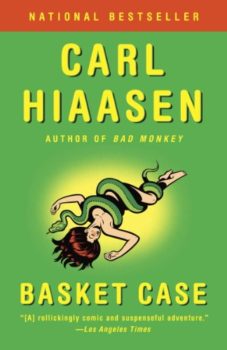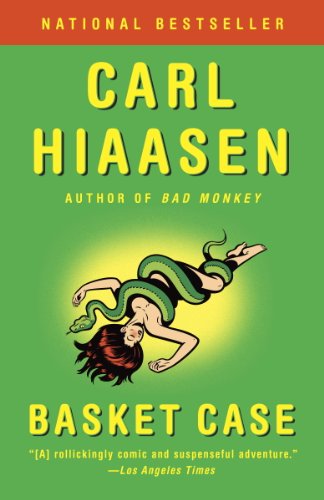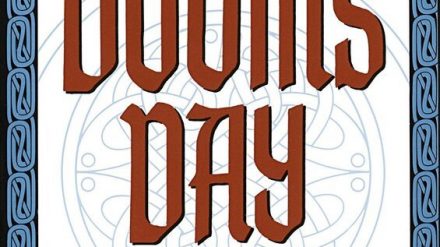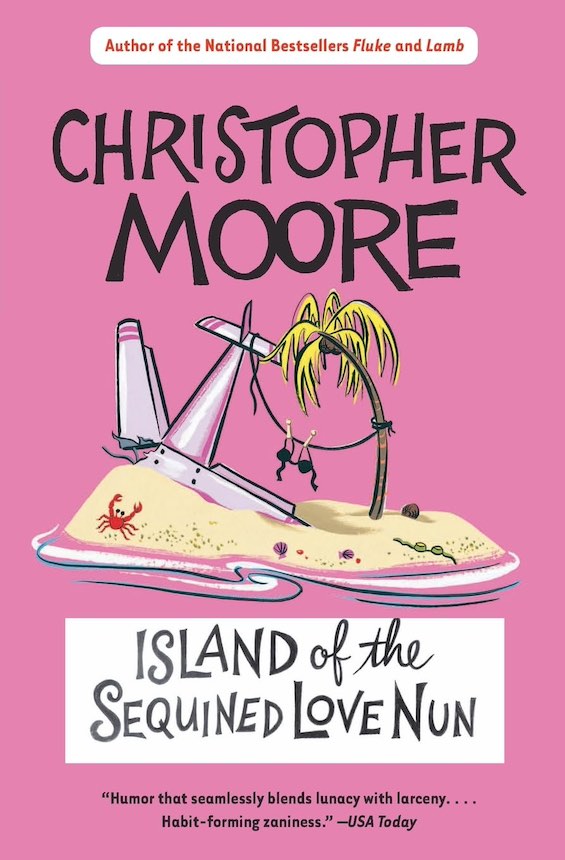
Carl Hiaasen is a very funny man. His comic novels about life in Florida are always amusing and sometimes hilarious. Inept criminals, corrupt politicians, and bumbling police officers populate his books. Few come off well. For example, “A disagreement over lane-changing etiquette has resulted in two motorists pulling semiautomatics and inconsiderately shooting each other in the diamond lane of the interstate.” And here he is in Basket Case, a send-up of newspaper publishers, writing about one of his protagonist’s ex-girlfriends: “Among Alicia’s multiple symptoms were aversion to sleep, employment, punctuality, sobriety, and monogamy. On the positive side, she volunteered weekends at an animal shelter.”
Estimated reading time: 5 minutes
Most of Hiaasen’s novels involve the destruction of Florida’s environment. However, in Basket Case, the author wades into a subject that is clearly at least as close to his heart: the steady decline of the newspaper industry. Hiaasen is a columnist for the Miami Herald, where he has worked since 1976. Here he is musing about the damage wrought to a small-town paper by its profit-mad, self-indulgent young publisher.
“Only two types of journalists choose to stay at a paper that’s being gutted by Wall Street whorehoppers. One faction is comprised of editors and reporters whose skills are so marginal that they’re lucky to be employed, and they know it. Unencumbered by any sense of duty to the readers, they’re pleased to forego the pursuit of actual news in order to cut expenses and score points with the suits . . . The other journalists who remain at slow-strangling dailies such as the Union-Register are those too spiteful or stubborn to quit.”
As you can see, newspaper publishers don’t come across well in this novel.
Basket Case by Carl Hiaasen ★★★★☆
Jack Tagger, 46, is one of the latter. He writes the obituaries for the Union-Register, a small-town Florida newspaper. He is obsessed with death, primarily his own. Hardly an hour goes by without his thinking of some famous person who died when he was Jack’s age. He blames his mother for this obsession, because she stubbornly refuses to tell him at what age his father died. (Jack has no memory of the man, who left them when he was an infant.) He is terrified that he won’t outlive his father. However, he’s not happy thinking about anyone else’s death, either. Funerals upset him. Autopsies are much worse. All this is highly unfortunate in a man who writes obituaries for a living.
Jack’s preoccupation with death may go back many years, even before his consignment to the obituary page. But his present position “at the top of the shit list” at the Union-Register began only three years ago. He doesn’t like to talk about why an award-winning investigative journalist was demoted so ignominiously to celebrate the lives of pet store owners, insurance salesmen, and fishermen. (Suffice to say, it was a very colorful incident.) But now a familiar-looking name has turned up in a fax from the local funeral home that may give Jack a way out.
Jack obsesses about rock music
Jack is almost as obsessive about rock music as he is about death. So he quickly realizes that the deceased, James Bradley Stomarti, 39, was better known years ago as Jimmy Stoma of the superstar band, Jimmy and the Slut Puppies. Jack sees his byline back on the front page if he can keep the story of Jimmy’s death to himself long enough to gather the facts.
As Jack launches into the interviews that will serve as background to Jimmy Stoma’s obituary, he quickly comes to understand that all is not as it seems. Perhaps the young musician didn’t accidentally die while diving in the Bahamas. Perhaps the man’s 24-year-old wife had a motive of some sort to kill him. And why are she and the people around her so eager to prevent Jack from learning what really happened?
Basket Case is anything but serious
These circumstances could be the basis of a serious thriller. But Basket Case is anything but serious. (Except when Hiaasen muses about the sad story of the newspaper industry.) For instance, here’s where Jack meets Cleo Rio, Jimmy’s widow: “The club’s motif combines the exotic ambience of a Costa Rican brothel with the cozy, down-home charm of a methamphetamine lab.”
The cast of characters in Basket Case includes several of Jimmy’s ex-bandmates, who display a wide array of colorful behavior, usually involving drugs; Jimmy’s sister, who earns her living dressing up as a cop on a SWAT team and stripping in front of a webcam; Jack’s inept and beautiful 27-year-old boss at the Union-Register, whom he is attempting to persuade to leave journalism; MacArthur Polk, 88, the former owner of the paper who has been dying at regular intervals for many years but somehow always continues to rally; and Race Maggad III, the profit-obsessed head of the company that owns 27 newspapers, including Jack’s.
For related reading
I’ve also reviewed Hiaasen’s Star Island (2010) at Carl Hiaasen skewers celebrities; Bad Monkey (2013) at A severed arm, a detective on the roach patrol, and a bad monkey; Razor Girl (2016) at Reality TV, African rodents, the roach patrol; and two of his young adult novels, both of which I found disappointing.
You might also be interested in My 17 favorite funny novels or Top 10 great popular novels.
If your taste runs more to genre fiction, check out:
- 20 excellent standalone mysteries and thrillers;\
- My 20 favorite espionage novels
- 10 top science fiction novels
And you can always find my most popular reviews, and the most recent ones, on the Home Page.



























